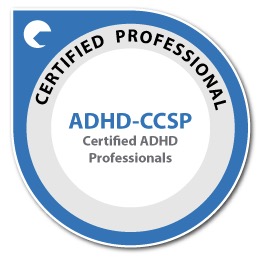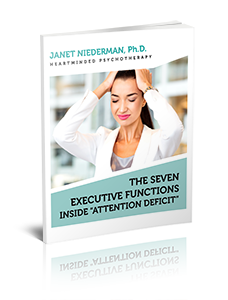If Others Only Knew
How Adult ADHD Impacts
Everything You Do…
Difficulties focusing and paying attention can lead to many problems. Do any of these statements reflect issues in your life?
- You have trouble keeping track of the projects you need to manage at your job. Trying to handle all of the deadlines and details makes you feel agitated and stressed.
- You have trouble focusing on things you don’t find interesting—such as a textbook or teacher—to the point where you might not absorb any of the information.
- You forget important events and items to the point that others feel you’re unreliable.
- You feel like you have a motor inside you that’s racing.
- You procrastinate and are easily distracted by video games or other entertainment.
- You turn to alcohol or weed to help you slow down. Sometimes they even reduce your being distracted by your own random thoughts.
At some point, you may find yourself feeling frustrated that your ADHD symptoms prevent you from demonstrating your true potential and intelligence to others. You might be worried that you won’t achieve your dreams and fear you won’t end up earning what you might have without this diagnosis — thoughts that can be difficult to deal with.
You’re Not Alone In Needing To Face The Problems Caused By Adult ADHD
 It’s been estimated that about 60 percent of children with ADHD in the United States become adults with ADHD. This suggests that approximately 8 million adults over the age of 18 (or 4% of the U.S. adult population) have ADHD, though many of these individuals may be undiagnosed and untreated. For folks like yourself, ADHD was not simply a childhood problem that got better over time. While the hyperactivity you may have experienced when younger has probably lessened, you may still have problems with attention and impulsivity, limiting your ability to meet adult responsibilities.
It’s been estimated that about 60 percent of children with ADHD in the United States become adults with ADHD. This suggests that approximately 8 million adults over the age of 18 (or 4% of the U.S. adult population) have ADHD, though many of these individuals may be undiagnosed and untreated. For folks like yourself, ADHD was not simply a childhood problem that got better over time. While the hyperactivity you may have experienced when younger has probably lessened, you may still have problems with attention and impulsivity, limiting your ability to meet adult responsibilities.
There’s a good chance that your ADHD was never diagnosed when you were young. Years ago most teachers weren’t aware that this might have been the source of poor grades or misbehavior. They may have been content to label you as “average” or “lazy.” A typical comment to your parents at Back-to-School Night might have been, “Tommy’s a bright kid but he needs to learn to sit still and to not lose his homework,” or “Sally’s a daydreamer. She’s not performing to her potential; she needs to try harder.” But no matter how hard you tried, it didn’t make a difference. In fact, trying harder frequently made things worse. You squeaked through school, hoping things would get better as you got older. But that hasn’t happened, and now your lack of attention to detail has even bigger consequences.
Unfortunately, the technology available today has not made matters easier. With multiple devices in every household — computers, laptops, tablets, cellphones, TVs — distractions confront you at every turn. The internet, Facebook, Twitter—these attention-grabbers have made the world that ADHD adults face more distracting than ever before.
Clients frequently mention they discovered their attention problems had a name after one of their kids was diagnosed with ADHD. Seeing their child’s academic improvement following appropriate therapy left them wondering, “Could treatment help me as well?”
Happily, the answer is yes. Adults who’ve sought treatment report changes that enhance their quality-of-life. Their greatest satisfaction stems from being empowered to present their ideas sequentially and coherently — feeling relief when others recognize their intelligence.
Treatment For Your Adult ADHD Is Worth It

I am a Certified Clinical Services Provider, having met the clear and established guidelines of training as set forth by the Institute of Certified ADHD Professionals, whose advisors include the nationally-renowned Russell A. Barkley, Ph.D. and Max Wiznitzer, M.D. This Institute and its certification process have been endorsed by CHADD (Children and Adults with Attention-Deficit/Hyperactivity Disorder), a CDC-funded national clearinghouse for evidence-based information about ADHD. As a result, you can be confident that I am able to offer you the best perspectives and methods available in this area.
I’ll start by taking a session to get to know you and learn about your life in general. After the initial meeting, we’ll focus in on the specific ADHD symptoms you experience. We’ll explore the strengths and weaknesses of your executive functions to see which ones you naturally rely upon most and which ones need to be strengthened. For treatment, we’ll review the range of options available, including:
- Medication
- Mindfulness training
- Enhancement of executive functioning
- Reading comprehension skills
- Technology aids (such as phone apps)
- Compensatory strategies
Additionally, we’ll check into other ways to reduce your stress.
Most likely, ADHD has also affected how you’ve learned to get along with others. We’ll explore its impact on your relationships, and how it may be contributing to arguments you have with family members or others. When needed, we’ll take a fresh look at how conflict resolution skills might be of help. It may also be useful to understand how early family dynamics made it difficult for you to learn to calmly focus on the world around you.
Clients feel pride in themselves as they become able to pay attention more easily. I’ve helped people stop procrastinating and stop avoiding situations that require focused concentration. They’re able to figure out their life purpose and sustain the motivation they need to accomplish their goals. Relationship conflicts may be eased as well. Following therapy, many clients report they’ve stopped being nagged by loved ones to do what they promised, and college students report their parents are delighted that their grades have improved.
You may still have reservations about ADHD therapy…
 I’ve tried so hard for so long to fix this. I don’t want to just try harder.
I’ve tried so hard for so long to fix this. I don’t want to just try harder.
Therapy for Adult ADHD is not about trying harder, which has been shown not to work! Trying harder simply leads to feeling more frustrated with yourself. Therapy helps to identify which brain processes are not working well in order to strengthen them—whether by medication, natural alternatives or compensation strategies. With improvements at this basic level, other changes become possible.
I’m not interested in taking ADHD medication. Will you pressure me into taking it?
I will not pressure you to take medication. Along with your doctor, I can help present the pros and cons of it, but it is for you to decide. I’ve worked with many individuals who have refused medication and have sought alternative pathways on their own instead. In particular, we will focus on understanding the pattern of strengths and weaknesses of your executive functions and discover strategies to maximize your success.
It’s hard to imagine myself making real changes. I’ve lived this way for so long.
I understand your sense of discouragement. ADHD has penetrated your sense of who you are and has set a low ceiling on what you’re able to do in the world. That’s why it’s important to work with a therapist who can recognize the whole range of personal and interpersonal issues that have resulted from your ADHD. We’ll address each of them as needed, from strengthening executive functioning and study skills, to asserting yourself with others and rebuilding self-esteem that’s taken a hit.
Managing ADHD To Achieve A More Successful Life Is Possible

Take a moment to look inside yourself to find your priorities and dreams as you look forward to getting help for your ADHD. Then find the courage to take the next step.
Download my Free Report to learn how the attention problems in ADHD are part of a whole family of important executive functions.
When you’re ready, click the button to schedule a free phone consultation with me. I look forward to your journey to your less stressed/more competent self.
If you prefer to email me a brief message, click here.

